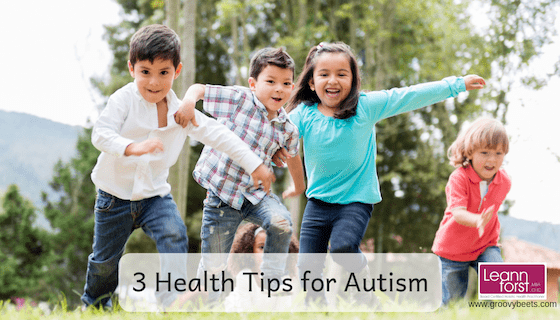End Bad Habits and Follow a New Roadmap to Better Health
According to the U.S. Department of Health and Human Services, only one in three American children are physically active every day. Plus, they now spend nearly eight hours a day in front of a screen, whether it’s a TV, laptop, or cell phone.
And adults don’t fare much better. Less than five percent of them participate in 30 minutes of physical activity each day. Even worse are our unhealthy eating habits that cause an estimated 700,000 deaths per year.
Click here to get your FREE “Healthy Grocery List”
It’s not much different for children with autism. Some are picky eaters, which can interfere with getting proper nourishment into their bodies, and some children on the spectrum might not be physically active enough, mainly because of social and communication problems or a late start on motor-skill development.
That’s not to say children on the spectrum aren’t capable of exercising. There are a number of sports – both team and individual – that are perfectly suited for those with autism. Ideally, though, it would be best if everyone in the family got up and got moving, and changed their diets, too. That way, they can all change their bad habits – not eating right and not getting enough exercise, among others – and put themselves on a path toward better physical health.
Here are three ways to stop bad habits and start new healthy ones.
1. Eliminate the Junk and Fast Food by Eating Fresh Food Whenever Possible
Our busy lives are one of the reasons we tend to eat fast food too often. It’s a lot easier to pick up something while we’re on the go than actually cook a meal. Plus, we tend to stock our homes with lots of junk food.
While there are a number of fast food items that are not good for children with autism, what is important is food that maintains good “gut health;” that is, food that directly benefits the gastrointestinal system and the mind, such as probiotics like non-dairy yogurt, asparagus, bananas. You can work through the picky eating issues by having patience and trying different foods.
2. Involve the Family Dog
If you have a dog, chances are, it likes to be walked. You can turn your daily dog walk into an exercise session, and have your autistic child accompany you. A nice half-mile walk twice a day (if possible) gets you, the child, and the dog outside for some fresh air and movement. Let the child hold the dog’s leash as you walk to give the child a sense of control. But under no circumstances should you allow the child to walk the dog alone. Kids with autism tend to wander off when unsupervised. Also, keep to a regular route to give the child a sense of familiarity and predictability.
3. Minimize Screen Time to Get Good Sleep
Some people can’t go five minutes without checking cell phones or tablet devices. Others stay in front of the TV for hours passively watching or playing video games, and still others spend hours with their laptops open surfing the web or working. The blue light from these devices actually tricks the brain into thinking that it’s still daylight outside, so it interferes with our bodies’ natural circadian rhythm. Good sleep is essential to good health, so set a “shut-off” time for all devices in the house. The earlier you can impose it in the evening, the better. Once you start doing this regularly, you’ll probably notice that you’re falling asleep sooner, sleeping more soundly, and waking up feeling more rested.
Families with autistic children can face some distinctive challenges every day. The entire family’s health can be an additional challenge to tackle as well. But if you eat fresh fare and remove junk and fast food from your diet, involve the family dog in daily walks, and cut back on time on the laptop or cell phone each night, you can put your family on a path toward healthy living.
Author Jasmine Dyoco loves crossword puzzles and audio books, learning (anything!) and fencing. She works with Educatorlabs to curate scholastic information.
 Login
Login










